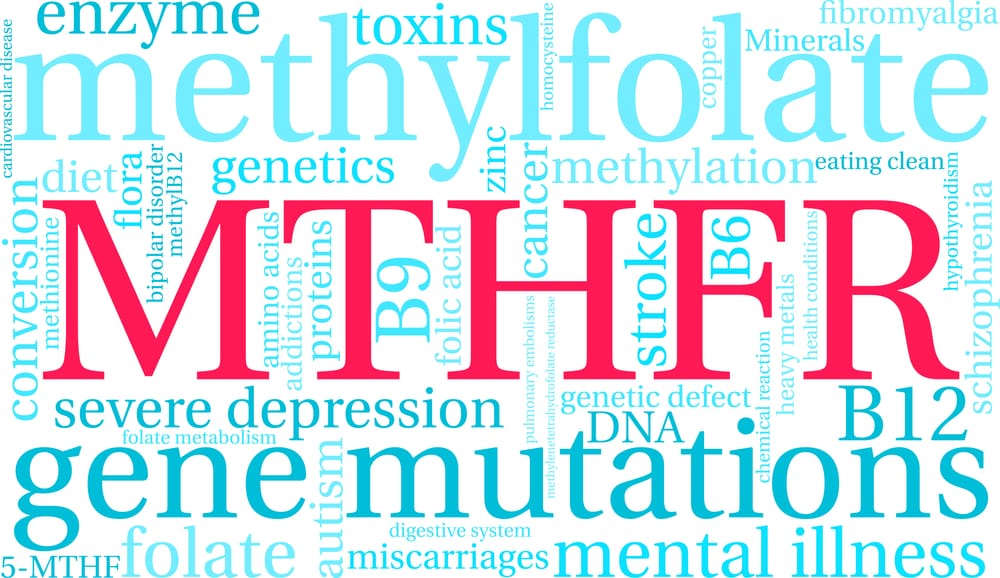As a health practitioner, you know that optimal biochemical function is fundamental to patient well-being. One of the most critical yet overlooked biochemical pathways is methylation, a process that affects detoxification, DNA repair, immune function, neurotransmitter balance, fertility and cardiovascular health.
Central to the methylation process is the MTHFR (methylenetetrahydrofolate reductase) enzyme, which plays a key role in folate metabolism and homocysteine regulation [1]. When this enzyme does not work efficiently, either due to environmental and genetic factors, methylation can be impacted.
Why Methylation Matters in Clinical Practice
Methylation is a biochemical process essential for a vast array of physiological functions, including cellular repair, detoxification, and neurotransmitter synthesis [2]. When the methylation cycle is impaired due to MTHFR polymorphisms, it can significantly impact a patient’s ability to maintain homeostasis, detoxify effectively, and regulate inflammation [3].
Patients with inefficient methylation often present with:
- Elevated homocysteine, increasing cardiovascular risk [4].
- Neurotransmitter imbalances, contributing to anxiety, depression, and cognitive dysfunction [5].
- Reproductive concerns, such as infertility, recurrent miscarriage and hormonal imbalance [5]
- Reduced detoxification efficiency, affecting toxin clearance and hormonal regulation [6].
- Compromised immune function, increasing susceptibility to chronic illness [7].
- Infertility or recurrent miscarriage [5]
Understanding MTHFR Gene Variants
Two well-documented MTHFR polymorphisms have significant clinical implications:
- C677T Variant (rs1801133): Homozygous individuals may experience a 70% reduction in enzyme activity, leading to increased homocysteine levels and an elevated risk of cardiovascular disease, miscarriage, and neural tube defects [4].
- A1298C Variant (rs1801131): While less impactful on homocysteine levels, this variant is linked to neurotransmitter imbalances, mood disorders, and chronic fatigue and oligozoospermia in men [5] . Compound heterozygotes (one C677T and one A1298C variant) may experience compounded metabolic disruptions [6].
Folate Metabolism and Clinical Considerations
Folate is a cornerstone of methylation, yet many patients struggle to properly metabolise folic acid, the synthetic form of folate found in fortified foods and standard supplements. The conversion of folic acid to its active form, 5-MTHF (5-methyltetrahydrofolate), can be inefficient in individuals with MTHFR polymorphisms [2]. Importantly a ‘methyl block’ or ‘methyl trapping’ can be a major cause of anxiety, depression, headaches, migraines and the like because methylfolate is being trapped and not able to be incorporated into the methionine cycle for use. For more on the methyl block and how to identify it get The Methylation Toolkit here.
Clinical evidence suggests that patients with MTHFR mutations benefit from methylated folate (5-MTHF) supplementation over folic acid to bypass enzymatic limitations and support methylation pathways [8]. Moreover, cofactors such as vitamins B2, B6, B12 (as methylcobalamin), and magnesium enhance folate metabolism and reduce homocysteine accumulation [9]. However, make sure to evaluate if there is a methyl block before starting methyl folate.
Practical Implications for Health Practitioners
MTHFR-related dysfunction is relevant in various clinical presentations, including:
- Cardiovascular disease: Elevated homocysteine contributes to endothelial dysfunction and thrombosis risk [4].
- Mental health disorders: Impaired methylation affects neurotransmitter production, increasing the risk of depression, anxiety, and neurodegenerative diseases [5].
- Hormonal imbalances: Methylation is crucial for estrogen metabolism and detoxification, impacting conditions such as estrogen dominance and PCOS [6].
- Fertility and pregnancy complications: MTHFR polymorphisms have been linked to recurrent miscarriage, neural tube defects, and poor pregnancy outcomes [7].
Read my published research paper on fertility and MTHFR here: https://pubmed.ncbi.nlm.nih.gov/37228355/
The Epigenetic Perspective: More Than Just Genetics
While genetic polymorphisms like MTHFR can predispose patients to certain health conditions,however, epigenetic factors—including diet, stress, environmental toxin exposure, and lifestyle—play a crucial role in gene expression [10].
Evidence-based interventions to support optimal methylation include:
✔ Methylated B vitamins (B6, B12, and folate) to optimise methylation pathways [9].
✔ Antioxidant support with glutathione, NAC, and vitamin C to reduce oxidative stress [11].
✔ Toxin reduction through dietary modifications, organic food choices, and reducing heavy metal exposure [12].
✔ Stress management techniques such as mindfulness, sleep optimisation, and adaptogenic herbs to support adrenal function and methylation [10].
Clinical Takeaway: Personalised Nutritional and Lifestyle Support
Understanding a patient’s MTHFR status allows for personalised interventions that address root biochemical dysfunctions rather than just symptoms. Functional genetic testing can provide valuable insights into a patient’s methylation capacity and guide targeted nutritional and lifestyle interventions [13]. At MTHFR Support we use the smartDNA genetic test which we believe gives practitioners a good array of genetic biochemical SNPs to evaluate, without disease based SNPs.
By integrating genomic insights with functional medicine principles, practitioners can optimise patient outcomes and improve resilience to chronic disease.
Ready to dive deeper? Ready to learn how address MTHFR, Methyl Blocks plus the significant different genes? Join the Functional Genomics Institute here
References
- Raghubeer S, Matsha TE. Methylenetetrahydrofolate (MTHFR), the one-carbon cycle, and cardiovascular risks. Nutrients. 2021;13(12):4562. doi:10.3390/nu13124562.
- Vidmar Golja M, Šmid A, Karas Kuželički N, Trontelj J, Geršak K, Mlinarič-Raščan I. Folate insufficiency due to MTHFR deficiency is bypassed by 5-methyltetrahydrofolate. J Clin Med. 2020;9(9):2836. doi:10.3390/jcm9092836.
- Tiffon C. The impact of nutrition and environmental epigenetics on human health and disease. Int J Mol Sci. 2018;19(11):3425. doi:10.3390/ijms19113425.
- Guo J, Hao X, Wang R, et al. MTHFR polymorphism’s influence on the clinical features and therapeutic effects in patients with migraine: An observational study. Front Neurol. 2022;13:1074857. doi:10.3389/fneur.2022.1074857.
- Ledowsky C, Steel A, Schloss J. MTHFR genetic polymorphisms and the risk of infertility in couples accessing assisted reproductive technologies: A systematic review. Adv Integr Med. 2021;8(3):220–229. doi:10.1016/j.aimed.2021.05.004.
- Ledowsky C, Mahimbo A, Scarf V, Steel A. Women taking a folic acid supplement in countries with mandatory food fortification programs may be exceeding the upper tolerable limit of folic acid: A systematic review. Nutrients. 2022;14(13):2715. doi:10.3390/nu14132715.
- Yadav HM, Jawahar A. Environmental factors and obesity. In: StatPearls. StatPearls Publishing; 2024. http://www.ncbi.nlm.nih.gov/books/NBK580543/.
- Lyon P, Strippoli V, Fang B, Cimmino L. B vitamins and one-carbon metabolism: Implications in human health and disease. Nutrients. 2020;12(9):2867. doi:10.3390/nu12092867.
- Parra M, Stahl S, Hellmann H. Vitamin B₆ and its role in cell metabolism and physiology. Cells. 2018;7(7):84. doi:10.3390/cells7070084.
- Waterland RA, Jirtle RL. Transposable elements: targets for early nutritional effects on epigenetic gene regulation. Mol Cell Biol. 2003;23(15):5293-5300. doi:10.1128/mcb.23.15.5293-5300.2003.
- Burton KJ, Krüger R, Scherz V, et al. Trimethylamine-N-oxide postprandial response in relation to gut microbiota composition and diet: A randomized crossover trial. Am J Clin Nutr. 2020;112(6):1448-1459. doi:10.1093/ajcn/nqaa226.
- Wang Y, Sun J, Yang P, et al. Detoxification capacity and implications for health. J Environ Sci Health C Environ Carcinog Ecotoxicol Rev. 2021;39(2):199-226. doi:10.1080/10590501.2021.1891618.
- Galland L. The gut microbiome, methylation, and metabolic health. Integr Med Clin J. 2014;13(3):46-54.









